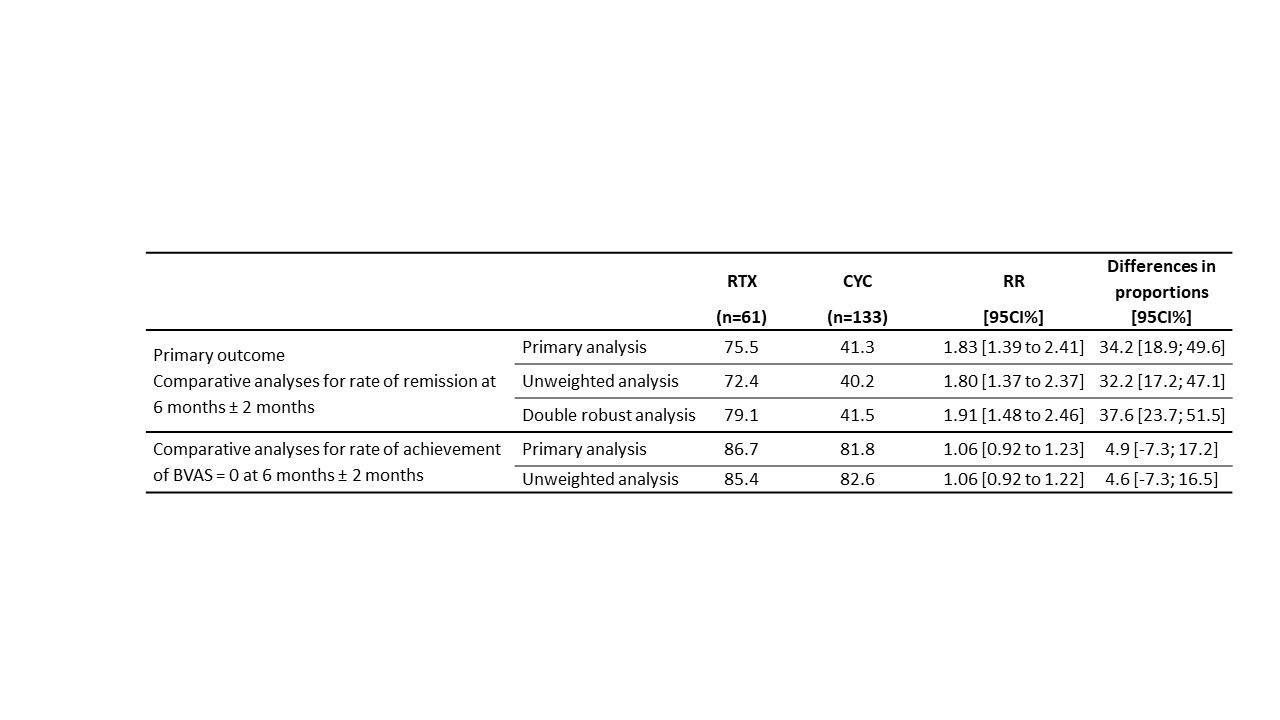Session Information
Date: Sunday, November 13, 2022
Title: Vasculitis – ANCA-Associated Poster II: Treatment Efficacy, Clinical Outcomes, Biomarkers
Session Type: Poster Session B
Session Time: 9:00AM-10:30AM
Background/Purpose: Randomized controlled trials showed rituximab (RTX)’s non-inferiority to cyclophosphamide (CYC) for induction therapy of ANCA-associated vasculitis and neither treatment was favoured in granulomatosis with polyangiitis (GPA). The objective of this study was to compare RTX and CYC to induce remission among a large number of unselected GPA patients.
Methods: We emulated a target trial using observational data collected into the French Vasculitis Study Group Registry. We included newly-diagnosed or relapsing GPA patients satisfying ACR classification criteria and/or Chapel Hill nomenclature between April 2008 and 2018, who had received either RTX or CYC induction treatment. The treatment groups were determined according to observed treatments, with no intervention/experimentation whatsoever from the investigators. Propensity score-based methods were used to correct for imbalance in the groups at baseline. Missing data were handled by multiple imputation. The primary outcome was remission rate at month 6 (± 2 months) defined by BVAS=0 and prednisone daily dose ≤10 mg. Secondary outcomes included the rate of patients with BVAS=0 at months 6 ± 2 months, at any prednisone dose.
Results: 194 GPA patients were included, mean age 54 years, new diagnosis in 165 (85%), PR3-ANCA positivity in 147 (81%); 61 received RTX and 133 CYC as induction therapy. In the weighted analysis, the primary outcome was reached in 75.5% vs 41.3% patients receiving RTX and CYC, respectively (relative risk, 1.83 [95% CI 1.39 to 2.41], risk difference +37.6% [95% CI 34.2 to 49.6], E-value for RR 3.06). In the subset of 27 MPO-ANCA–positive GPA patients, 8/10 and 8/17 in the RTX and CYC groups, respectively, met the primary endpoint (unweighted relative risk, 1.74 [95% CI 0.96 to 3.18]). The number of patients who achieved a BVAS of 0 at 6 months ± 2 months, without taking into account the prednisone dose, was 47/55 (85.4%) and 95/115 (82.6%) in the RTX and CYC group, respectively.
Conclusion: This emulated trial in GPA patients shows that RTX as induction therapy is associated with more frequent achievement of remission than CYC in real-world data.
To cite this abstract in AMA style:
Puéchal X, Iudici M, Perrodeau E, bonnotte b, Lifermann F, Le Gallou T, Karras A, Blanchard-Delaunay C, Quéméneur T, Aouba A, Aumaître O, Cottin V, Hamidou M, Ruivard M, Cohen P, Mouthon L, Guillevin L, Ravaud P, Porcher R, Terrier B. Rituximab versus Cyclophosphamide for Induction Therapy in Granulomatosis with Polyangiitis: A Target Trial Emulation Study [abstract]. Arthritis Rheumatol. 2022; 74 (suppl 9). https://acrabstracts.org/abstract/rituximab-versus-cyclophosphamide-for-induction-therapy-in-granulomatosis-with-polyangiitis-a-target-trial-emulation-study/. Accessed .« Back to ACR Convergence 2022
ACR Meeting Abstracts - https://acrabstracts.org/abstract/rituximab-versus-cyclophosphamide-for-induction-therapy-in-granulomatosis-with-polyangiitis-a-target-trial-emulation-study/

